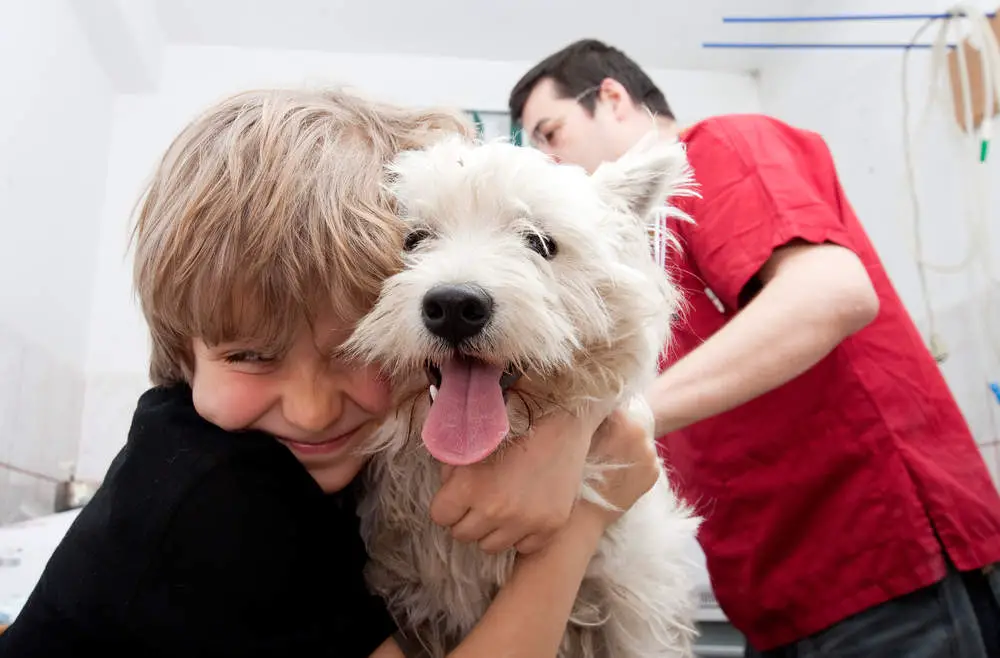
You may have heard of the West Highland White Terrier being referred to as a ‘Westie’—an appropriately sweet name for an incredibly sweet dog. Westies are small dogs that typically stay low to the ground. They have a bubbly and energetic personality, making for great company for a family with small kids or for an apartment that can accommodate only a small to medium-sized pooch.
The breed is highly active and sociable, and if your expectation from a pet is that they will greet you with enthusiasm when you walk through the door, then the Westie will not disappoint. In other words, Westies are the perfect advertisement for a dog breed that is smart, affectionate and ideal for even a small apartment. If you are wondering if a West Highland White Terrier would make a good fit for a pet in your household, the following are some of the things you may want to know.
West Highland White Terrier: At a Glance
- Height: 10 to 11 inches
- Weight: 13 to 20 pounds
- Appearance: Harsh white outer coat, soft white undercoat; pointed triangular ears
- Temperament: Friendly and affectionate, but with a streak of independence
- Lifespan: 12 to 16 years
- Most Suitable For: Most households, ideal for apartment living
Origin
The Westie comes from a group of terriers. The breed has been around for more than a century, with the American Kennel Club recognizing it officially in 1908. The origins of the breed can be traced back to Scotland, specifically Poltalloch. Scotland is known for the terrier breeds, and there have been several discussions and findings in the canine group that suggest that all the terriers from the region share the same lineage. This would make the Scottlies, Dandie, Cairns, etc. cousins of the Westie at least, if not immediate siblings.
Westies have been companion dogs from the beginning but they were also useful for hunting small animals and vermin. The predominant color of the Westie was said to be red at first.
But the legend goes that Colonel Edward Malcolm, the Laird of Poltalloch was once out hunting in the woods with his Cairn terriers. He saw some movement in a push, and fired his gun thinking it was a rabbit, only to realize that he had shot one of the dogs in his hunting entourage. Since then, he decided to breed only white terriers as they would be easier to spot in the forest.
Around the same time, the Campbell of Rosneath was also breeding white dogs, which he referred to as “Roseneath” terriers (named after his estate). The two dogs combined became what we know today as the West Highland White Terrier.
Learn more about the Westie breed and mixes with these articles:
- 17 Westie Mix Breeds You Will Love
- Westiepoo (Westie Poodle Mix) Breed Information
- Cairn vs Westie Comparison Guide
- How Much Do Westies Cost?
- Fourche Terrier (Westie Yorkie Mix) Breed Information
- Highland Maltie (Westie Maltese Mix) Breed Information
- Jack Highland Terrier (Westie Jack Russell Mix) Breed Information
- Scoland Terrier (Westie Scottie Mix) Breed Information
- Maltese vs Westie Comparison Guide
- Westie vs Yorkie Comparison Guide
- Westie vs Scottie: What’s the Difference Between the Breeds?
- Westie vs Pug Dog Breed Comparison
- Westie vs Schnauzer: Which One Is Right For You?
Westie Temperament and Behavior

Westies are playful and affectionate dogs that have been bred from the beginning as companion dogs. However, as has been elaborated above, they were also hunting dogs and continue to have a prey drive, especially for smaller animals and rodents. Don’t be alarmed if you catch your Westie playing with the carcass of a vermin or rodent, but it is certainly a practice you may want to discourage if you happen to have smaller pets at home.
They are generally sweet-tempered dogs that get along well with young children, are friendly with house guests and also get along with other dogs. They do like to bark, and will do so at the slightest provocation—not in a threatening way, but simply as a way to communicate. You will find that they also like to dig a lot. Both these behaviors sound alright, until you find yourself waking up to your dog barking in the middle of the night, or coming home to find your sofa in shreds because your Westie had a gala time digging.
Like several other breeds of this size, Westies can also be prone to developing small dog syndrome—certain behaviors that would not be encouraged in bigger dogs, such as snapping, jumping on people, not letting people sit near them or on their spot, etc. This can be addressed easily if your pet is socialized as a pup and these behaviors are actively discouraged.
Learn more about Westie Temperament and Behavior with these articles:
- Do Westies Like to Cuddle?
- Are Westies Good Family Dogs?
- Are Westies Good for Seniors or Retirees?
- Are Westies Good for First Time Dog Owners?
- Are Westies Better in Pairs?
- Do Westies Bark a Lot?
- Can You Leave a Westie Home Alone?
- Can Westies Go Off Leash?
- Do Westies Chew Furniture?
Caring for a Westie

A Westie is a great pet to have and typically does not require a lot of work. They are sociable and great with kids, and also perfect if you are looking for a small pooch for your apartment, especially if you live on your own.
In other words, this is the kind of breed that is great even if you are taking care of it on your own and do not have a family to fall back on for help. Of course, the responsibility of taking them for walks and keeping them active will fall solely on you.
But unlike bigger dogs, such as Labradors or Dobermans, Westies do not require as much space and work. They can be managed quite easily. However, it has to be said from the outset that the Westie pup needs to be socialized from an early age so their affectionate and friendly personality can be encouraged (and you can have guests come over without any fear of upsetting your pooch). The following are some of the main areas in which the Westie will require care:
Diet and Nutrition
Caring for a pet means thinking about what you are going to feed them, first and foremost. Typically, a Westie does very well with two meals in a day. The meals generally consist of up to 1.5 cups of dry food. You can experiment with different kinds of dog food, there is no specific brand only for Westies.
However, the best judge of whether the meals are working will be your pet. Pay attention to the signs they are giving you. If your Westie does not enjoy the food you are giving them, they will more than let it be known. So there will be a process of hit and trial that you will need to embark on before you find the kind of food choices that work best for your dog and what your dog seems to enjoy the most.
It is also of the utmost importance to replace the water in your dog’s bowl frequently and give them fresh water to drink. The diet will, of course, change as your dog grows older so it is recommended that you work along with a veterinarian to figure their food plan as and when it needs to be tweaked.
Possible Health Issues
Westies are more or less low-maintenance dogs, but there are certain conditions that your dog may inherit. This is not as frequently occurring in dogs that are carefully bred and meet all the breeding standards set by the AKC and other such well-respected clubs.
But there are cases where the diseases or health problems do filter through during the process of breeding. One of the common hereditary ailments is craniomandibular osteopathy, also known as Westie jaw. This condition is triggered by a recessive gene that can create trouble for the pooch while swallowing and chewing food. In many cases, the condition can be treated with anti-inflammatory drugs. But often, the condition is painful and can be quite severe. Some of the other health issues you may want to keep a look out for include:
- Addison’s Disease: A disorder where the adrenal glands are not able to produce appropriate amounts of aldosterone and cortisol—hormones that are known for producing the fight or flight response in the body.
- Legg-Calve-Perthes Disease: This is a disorder where the top of the femur bone in the hind leg suffers spontaneous degeneration.
- Skin Allergies: Inflammatory diseases like dermatitis which may be triggered by grass, mold or any substance that your dog’s body considers an allergen.
To rule all of these possibilities out, it may be helpful to get hip, knee and eye tests done for your Westie while they are still a pup. The minor health problems are things every dog owner needs to tend to. However, if there is a danger of your pooch developing any of the serious health conditions mentioned above, the sooner you know the better it is to start treatment and provide them with the right kind of care.
Learn more about Westie health with these articles:
- 13 Common Health and Skin Problems to Watch for in Westies
- Everything You Wanted to Know About Westie Lung Disease (Idiopathic Pulmonary Fibrosis)
- Best Dog Beds for Westies: Top 5 Picks, Reviews and What to Look For
- How Long Do Westies Sleep?
- Westie Lifespan and How to Care for a Senior Westie
- Do Westies Smell Bad?
Training
As has been mentioned before, it goes without saying that your Westie needs to be socialized from an early age. Even if their natural predisposition is to be friendly and affectionate, remember that they are also dogs that were taken on hunts in addition to being companion dogs.
So it is one thing for them to be chasing squirrels in the park, but if you have a pet guinea pig or rabbit, they need to be safe living in the same house as an energetic Westie. Westies are also extremely playful and fun-loving, so you will need to draw some boundaries and make them differentiate between playing hours and work hours.
They are intelligent dogs that are not difficult to train and socialize. However, they do have an independent personality and can become stubborn when rubbed the wrong way or if they do not find an environment that is conducive to their training.
Westies respond well to positive reinforcement, so keep some of their favorite treats handy for when they have been especially good. They are clever animals, but like all animals, they require patience and compassion when you are training them—just as a baby would!
Learn more about Westie training with these articles:
- Are Westies Easy to Train?
- Best Dog Treats for Westies: Top Picks for Training, Dental, Puppies and More
- Best Dog Crates for West Highland White Terriers: Top Picks, Sizing Guide and More
Exercise
Westies are an energetic breed that certainly require a lot of exercise. They like to run around and be active. Since they are small dogs, it does not matter if you live in a small apartment and do not have a garden or backyard for them to run around in.
However, it would be good for them to also have some open space to frolic about in. Having said that, you still need to take them out on walks frequently (at least twice a day), and leave some empty floor space in your house for them to run around in.
It is important for the pooch to expend all their excess energy through the day. This will also allow them to fall asleep better at night, or encourage them to take naps during the day. They will also not be bored or restless, the brunt of which will invariably be faced by your furniture and upholstery.
Learn more about Westie exercise with this article:
- Are Westies Good for Hiking?
- How Much Exercise Does a Westie Need?
- Top 5 Best Harnesses for Westies
- Can Westies Swim?
- Best Dog Toys for Westies: Top 5 Picks
Grooming
As has been mentioned above, Westies have a harsh outer coat and a kind of soft undercoat. Since their coat can be quite thick (both outer and inner coat combined), it can get tangled quite easily. Besides, the outer coat is harsh so it is important to take good care of it and keep it clean.
Though Westies do not shed as much, it is important to brush them daily so you can remove dead fur daily and also prevent the coat from matting. Make a routine out of brushing their coat daily and make it a 2-3 minute session.
The sooner you incorporate this into your pet’s routine, the more cooperative they will be. Therefore, it is important to start when they are young as they will learn as pups that this is an aspect of what they do in the day and cannot be avoided (not all dogs like to have their coat brushed out).
Remember, Westies are playful dogs and will get up to something almost everyday. If they have been rolling about in the grass or like to play in a heap of dried leaves, it is especially important to keep the outer coat clean as the Westie outer coat is more prone to matting than other breeds with shorter coats.
The outer coat will also need clipping every four months or so to keep the coat neat and clean. If you live in a warm enough climate, you can strip the outer coat a few times during the year. This helps to keep the coat light and it also makes the coat grow back healthier and more lush.
Learn more about Westie grooming with these articles:
- Do Westies Shed?
- How Often Should I Bathe My Westie?
- Best Shampoo for Westies: What You Should Look For and Top 5 Picks
- Best Brush for Westies: Tips, Tricks and Reviews for Finding the Right One
- Westie Haircut Styles Guide
- Can Westies Be Black?
- Best Dog Clippers for Westies: Top 5 Picks to Groom at Home
So Should You Get a Westie?

From the descriptions above, you may have taken away a fairly positive picture of Westies. But just because they are a good breed objectively does not have to mean they would be a good fit for you. The following is a brief synopsis of their pros and cons that may help you decide better whether or not you should bring a Westie into your family:
Pros
- Westies are perfect for apartment living. They are small and can get the right amount of exercise even from doing activities around the house that keep them active (though that does not mean you can skip the walks outside, especially to house break them).
- They are extremely friendly and affectionate dogs. If you live alone in an apartment and are looking for company, they are the perfect breed. They do not require as much work as a larger breed might, they live comfortably in an apartment, and they will make you feel ever so special.
- They are really great with children. If you have young kids around the house and wondering what breed of dog would be safe to have around them, a Westie is that breed. Sure, they will require socialization but so will every other breed.
Cons
- They tend to bark and dig a lot—behaviors you can curb or control, but they are unlikely to go away completely. These are small dogs with large personalities. Which is great for the most part, but not when you want to sleep in on a Sunday morning but your dog cannot cut out the barking.
- They are intelligent dogs with an independent streak. Which also means they can become quite stubborn (and also develop small dog syndrome) if not trained properly. You will need to set boundaries very early on with a Westie and establish your authority.
- They can be prone to certain common ailments that may have been avoided if the dog has been bred keeping in mind the high standards of various respected kennel clubs. However, this cannot always be a guarantee and some of the common health issues Westies have can be quite stressful and bothersome especially for the pooch, but also for their owner who is providing them with care.
Parting Words
With the pros and cons of the breed laid out in front of you, you should be able to make a more informed decision. It must be said that no dog breed is bad, but some are just more suitable for certain household setups than others. It is up to you to find a breed that matches your needs and the environment you can provide to the dog.
A Westie is a dog that ticks off plenty of boxes. They do not require as much exercise as a larger dog might, they make for great apartment pets and are also great with children if they are brought into a home with small kids. Now, it is for you to see whether the cons that have been mentioned above are a deal breaker.
